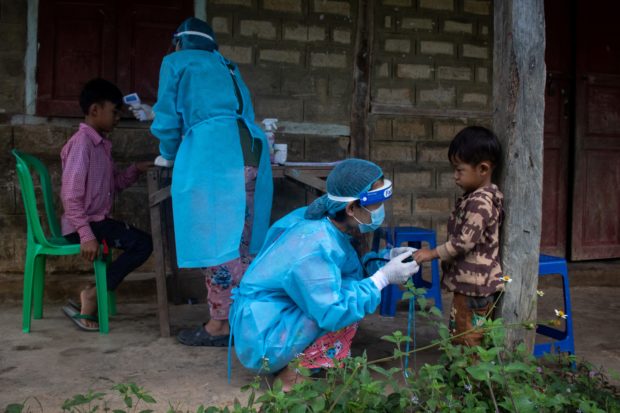Treating COVID-19 patients in secret Myanmar clinics

This photo taken on October 17, 2021 shows healthcare workers as they check children for signs of the Covid-19 coronavirus at a health centre in Demoso township in Myanmar’s Kayah state. AFP FILE PHOTO
KAYAH, Myanmar — A handful of Myanmar nurses hiding from the junta have been running makeshift clinics to treat Covid patients and resistance fighters with medicine smuggled past military checkpoints.
With bags packed, they are always ready to flee as healthcare workers find themselves at the forefront of a civil disobedience movement against the February coup and a crackdown on dissent that has killed more than 1,300, according to a local monitoring group.
A boycott of government institutions has left many hospitals without staff and the junta has arrested and killed scores of protesting health workers, rights groups say.
Aye Naing — not her real name — left her job in a public hospital soon after the coup and in June began volunteering in Kayah state in Myanmar’s east, where the military and anti-coup fighters have clashed repeatedly.
“When the fighting starts, we have to run and hide in the jungle,” she told AFP at a clinic housed at a school abandoned because of fighting near the town of Demoso.
Article continues after this advertisementAfter a devastating Covid wave in June and July — where new daily cases peaked at 40,000 — the junta has said new infections are down to around 150 per day, and that the Omicron variant is yet to appear in Myanmar.
Article continues after this advertisementBut with the struggling health system in shambles, limited testing is being done.
In Kayah around 85,000 people have been displaced by the violence, according to the UN’s refugee agency, with many crowded into camps where infections spread easily.
Most of Aye Naing’s patients are displaced families, she said, as well as fighters from local People’s Defense Force (PDF) groups — militias that have sprung up across the country to fight the junta.
“I was told there weren’t many doctors and medical workers in this area, and that villagers were asking for them,” she said.
“So, I made the decision to come, and tried to get hold of some medical supplies.”
At one village, her team conducts swab tests through a small tear in a sheet of plastic stretched over a bamboo frame.
Those who test positive are prescribed paracetamol or vitamins, the only medicine on offer.
Donated oxygen must be used sparingly: refilling canisters involves a trip to the closest large town, passing junta checkpoints along the way.
After each shift, Aye Naing removes her plastic protective suit and disinfects it, along with her mask, ready for the next one.
Blocking medicine
In an empty classroom, an infected PDF fighter sits out his quarantine strumming a guitar.
In areas where resistance to its rule is strong, the military has blocked the delivery of humanitarian aid and medical supplies, according to a recent Human Rights Watch report.
“Burmese military check everyone at their gates and arrest people they find carrying medicines,” said Hla Aung, another nurse working at the clinic whose name has been changed to protect her identity.
“It’s like we are risking our lives.”
In the six months following the coup, 190 health workers were arrested and 25 killed, according to a report by Insecurity Insight, Physicians for Human Rights, and Johns Hopkins University.
But Aye Naing said she will keep going.
“My parents’ support keeps me strong,” she said.
“My father has sent as much medicine as he can.”
For more news about the novel coronavirus click here.
What you need to know about Coronavirus.
For more information on COVID-19, call the DOH Hotline: (02) 86517800 local 1149/1150.
The Inquirer Foundation supports our healthcare frontliners and is still accepting cash donations to be deposited at Banco de Oro (BDO) current account #007960018860 or donate through PayMaya using this link.